Sanae Takaichi wins parliamentary vote to become Japan's first female prime minister
The 64-year-old leader of the ruling Liberal Democratic Party unexpectedly won a majority in a first round of voting in the lower house of parliament.
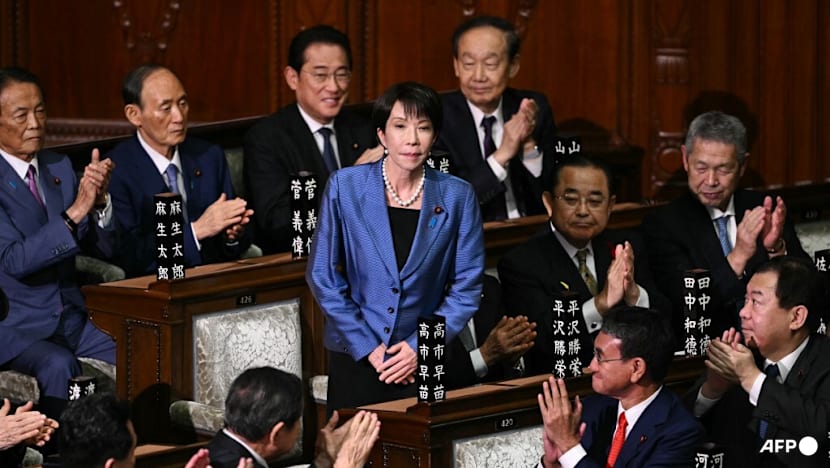
Liberal Democratic Party (LDP) President Sanae Takaichi stands up to acknowledge the applause after she was selected as Japan's new prime minister during an extraordinary session of the lower house of parliament in Tokyo on Oct 21, 2025. (Photo: AFP/Philip Fong)
TOKYO: Japan got its first female prime minister on Tuesday (Oct 21) after Sanae Takaichi, leader of the ruling Liberal Democratic Party (LDP), won the lower house vote to choose the country's next leader.
Japan's fifth premier in as many years will lead a minority government and has a bulging in-tray, not least a scheduled visit by United States President Donald Trump next week.
The lower house of parliament appointed Takaichi, an admirer of Margaret Thatcher, as prime minister on Tuesday, after she unexpectedly won a slim majority in a first round of voting.
Looking serious, the 64-year-old stood and bowed several times to lawmakers.
The upper house then voted in her favour, although in a runoff after Takaichi fell short of a majority. Takaichi formally took office after meeting with Emperor Naruhito.
The former heavy metal drummer became on Oct 4 head of the LDP, which has governed almost non-stop for decades but is losing support.
Six days later, the Komeito party, uncomfortable about Takaichi's conservative views and an LDP slush fund scandal, quit their coalition.
This forced Takaichi to form an alliance with the reformist, right-leaning Japan Innovation Party (JIP), which was signed on Monday evening.
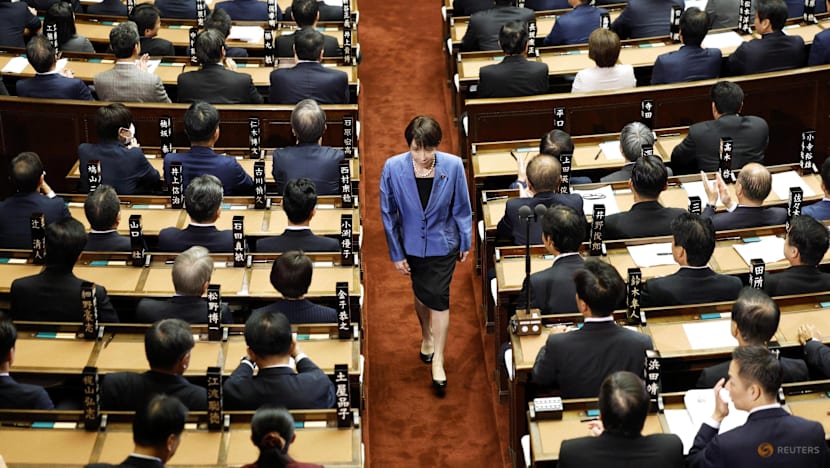
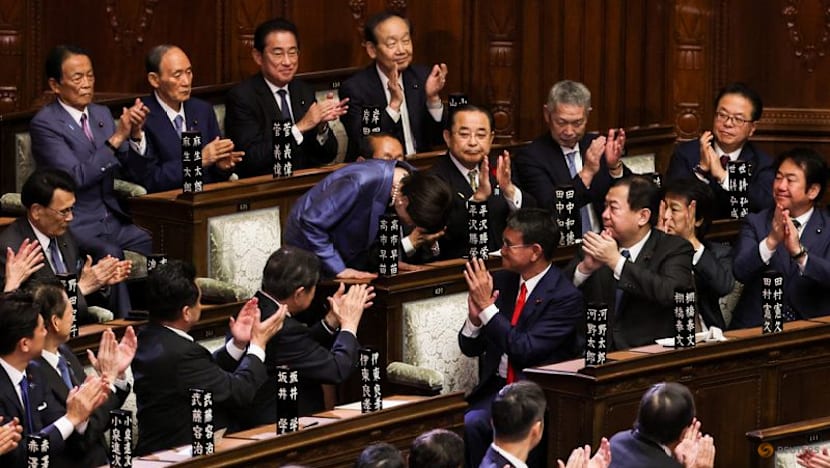
JIP wants to lower the consumption tax rate on food to zero, to abolish corporate and organisational donations and to reduce the number of MPs.
Takaichi pledged Monday to "make Japan's economy stronger, and reshape Japan as a country that can be responsible for future generations".
"She's a strong-minded person, regardless of being a woman," pensioner Toru Takahashi, 76, told AFP in Takaichi's hometown Nara.
"She's not like Trump. But she's clear about what's right and wrong."
NORDIC
Takaichi on Tuesday named just two other women in her 19-strong Cabinet despite previously promising "Nordic" levels of representation in her government.
They are Japan's first woman finance minister, Satsuki Katayama, and Kimi Onoda as economic security minister, new Cabinet secretary Minoru Kihara said.
Takaichi had said last month that the gender balance in her cabinet and the executive committee of her ruling party "will be comparable to those of Nordic countries".
Outgoing premier Shigeru Ishiba had two women in his Cabinet. The record is five, a level last reached under Ishiba's predecessor Fumio Kishida.
Japan ranked 118 out of 148 in the World Economic Forum's 2025 Global Gender Gap Report. Around 15 per cent of lower house MPs are women and corporate boardrooms are overwhelmingly male.
Takaichi has said she hopes to raise awareness about women's health struggles and has spoken candidly about her own experience with menopause.
But she opposes revising a 19th-century law requiring married couples to share the same surname, and wants the imperial family to stick to male-only succession.
In Nara, company worker Keiko Yoshida, 39, told AFP she hopes Takaichi will "make Japan a more liveable place for women".
"I'd be happy if we saw more policies from a woman's perspective: support for childcare, and help for women returning to work after having children," agreed student Nina Terao, 18.
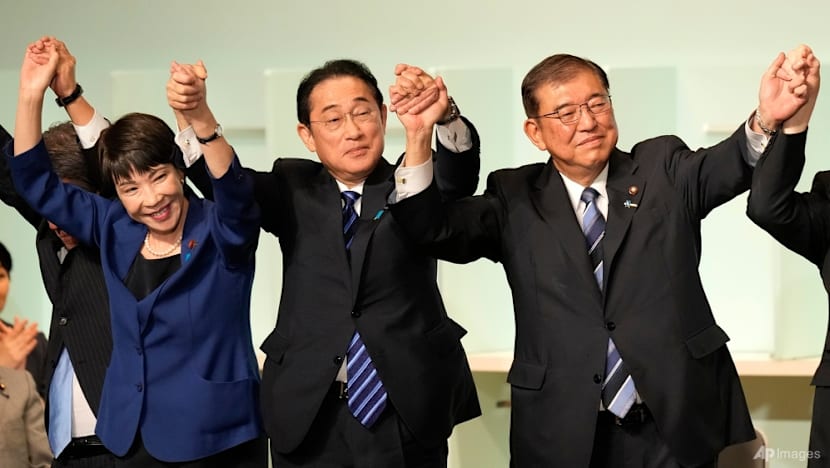
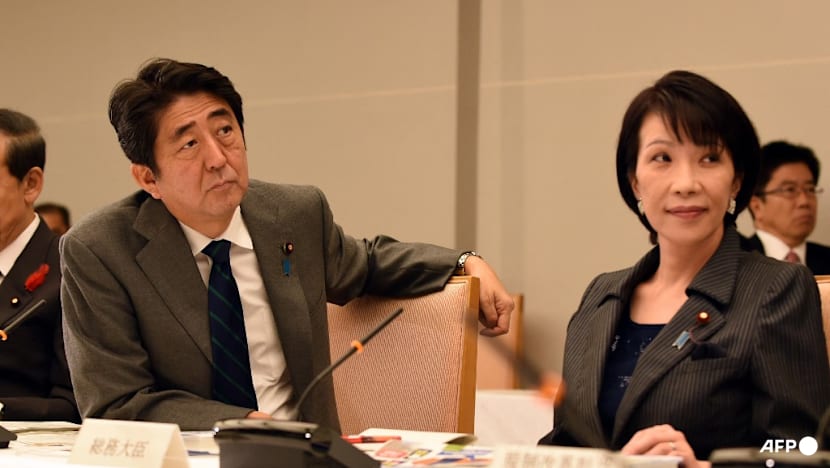
ABENOMICS
Details of Japan's mooted US$500 billion in investments as part of its trade deal with Washington are unclear.
Trump also wants Tokyo to stop Russian energy imports and boost defence spending.
"I'd like her to be a prime minister who can clearly say 'No' when needed," Satoshi Sakamoto, 73, another Nara pensioner, told AFP.
Takaichi's other many challenges include reversing the decline of Japan's population and injecting some vim in the flatlining economy.
Being in a minority in both houses of parliament, the new coalition will need support from other parties to push through legislation.
Takaichi has in the past backed aggressive monetary easing and expanded government spending, echoing her mentor, former premier Shinzo Abe.
Despite walking back on these "Abenomics" calls in the LDP leadership contest, her victory has boosted Japanese stocks to record highs.
She previously said that "Japan is completely looked down on by China", and that Tokyo must "address the security threat" posed by Beijing.
But she has since toned down her rhetoric on China, and stayed away last week from a festival at the Yasukuni shrine - she has been a regular visitor before - honouring Japan's war dead.
Takaichi will also be under pressure to restore the fortunes of the LDP after a string of poor election results that cost Ishiba his job.
Smaller parties gaining support include the populist Sanseito, which calls immigration a "silent invasion".
"Prices have gone up, and it's tough," Nara pensioner Satoe Tominaga, 77, told AFP, saying she was "50-50" about Takaichi.
"Honestly, I mostly shop at 100-yen (US$0.66) stores now."















